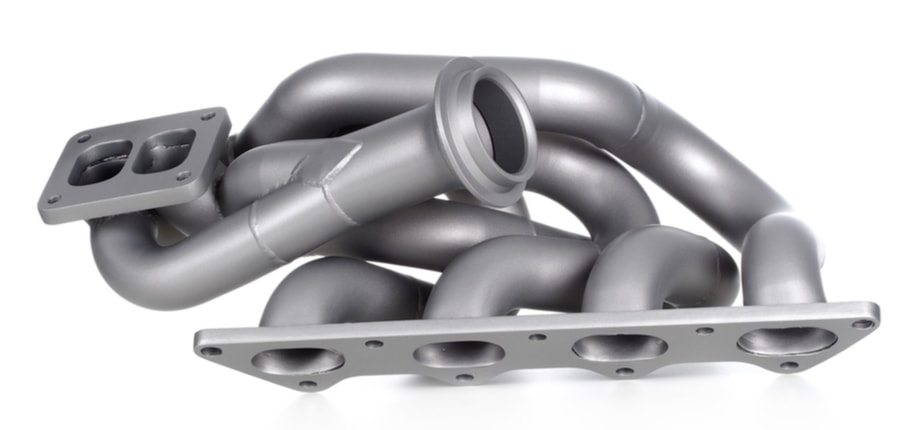The exhaust manifold is the outlet from the engine. It lets spent exhaust gasses exit the engine while also collecting them together to send them down the exhaust piping and safely out the back of the vehicle.
The exhaust manifold is normally a cast iron piece that is bolted to the side of the cylinder head with a gasket and routes the gasses to the exhaust system. This is also being designed in such a way as to provide maximum flow and cylinder scavenging to keep the airflow in the engine at peak performance.
How Much Does It Cost To Repair An Exhaust Manifold?
Because there are a few different ways that an exhaust manifold can fail, there are varying costs to repair. These depend on the extent of the damage to the manifold and how much is involved in removing the manifold to perform the repair.
We will go through a few common scenarios in order to get an approximation of the cost to replace exhaust manifold. We will use an average shop rate of $80 per hour as a baseline.
1. A 2012 Ford Focus with a 2.0L engine has a tapping noise when cold. The technician inspects and finds carbon marks on the exhaust manifold. The technician removed the manifold and finds that it has been warped from heat cycling, but is able to be machined flat.
- Remove and reinstall the manifold – 4.9hrs at $80/hr, $392
- Manifold machining – $40
- Manifold gasket and hardware – approx. $50
- Shop supplies – $15
- Total cost of repairs – $497
2. A 2006 Chevrolet Silverado 1500 with a 5.3L engine has a tapping noise all the time, but louder when cold. The technician inspects and finds a crack in the left-hand exhaust manifold.
- Remove and install the manifold – 1.3 hrs at $80/hr, $104
- New exhaust manifold – approx. $95
- Exhaust manifold gasket and hardware – approx. $50
- Shop supplies – $15
- Total cost of repairs – $264
3. A 2009 Dodge Ram 2500 with a 5.9L diesel engine has a whistling noise and lacks power under acceleration. The technician inspects and finds two broken exhaust manifold bolts on the cylinder head. They remove the manifold and find that it is warped but machineable.
- Remove and install the manifold – 4.2 hrs at $80/hr, $336
- Drill out and repair two broken bolts – 2 hrs at $80/hr, $160
- Machine the exhaust manifold – $40
- Exhaust manifold gasket and hardware – $60
- Shop supplies – $15
- Total cost of repairs – $611
4. A 2016 BMW 328i with a 2.0L turbocharged engine has a whistle and a lack of power when accelerating. The technician inspects and finds the turbocharger to manifold flange leaking from a crack. The technician removes the turbo and sends it away to have a new flange welded on.
- Remove and reinstall the turbocharger – 7.0 hrs at $80/hr, $560
- Turbo flange replacement – $150
- Turbo to manifold gasket and hardware – approx. $40
- Shop supplies – $15
- Total cost of repairs – $765
Due to the varying complexities associated, the exhaust manifold repair cost can vary from approximately $150 to $1,000, but most repairs will be closer to $150 to $400.
How Can The Exhaust Manifold Fail?
Because of the operating conditions that the exhaust manifold is subjected to, it must be able to withstand a temperature differential of upwards of 1,000 degrees, as well as high-pressure pulses from the exiting exhaust gasses.
Due to the extreme heat and pressure, the metal of the exhaust manifold, as well as the bolts or studs used to mount the manifold to the cylinder head, it is common for either the manifold or the hardware to fail during the lifetime of the vehicle. This can be either in the form of a broken manifold bolt or stud, a manifold that has warped and leaks past the gasket, or a crack in the manifold itself.
When an exhaust manifold fails, it is characterized by a certain sound which can be described as tapping or clicking on a naturally-aspirated engine, or a whooshing noise and low power on a turbocharged engine. This noise can be heard most through the fender well and when the engine is first started cold.
This can be diagnosed by looking for carbon marks that lead out from the manifold. When an exhaust manifold has just started to leak, the noise will normally go away as the engine warms up and the metal of the manifold expands.

How Can Exhaust Manifold Repairs Be Avoided?
Exhaust manifold repairs can be costly and are sometimes avoidable. However, they are often present without any warning.
In order to prevent damage to the exhaust manifolds, it is critical to allow the normal heat cycling to happen as slowly and easily as possible. This will help to mitigate stresses from heat cycling and keep the manifolds from being overworked.
In order to keep the stress on the manifolds down, it is important to allow the vehicle to fully warm up before putting it under major loads and to allow it to cool down slowly to keep from starting cracks in the manifolds. On a turbocharged engine, this is especially important.
After a long trip or major load (such as towing a trailer), the engine should be allowed to idle in order to cool the turbo and the manifold down before shutting the engine down. Letting a very hot engine shut down immediately can cause cold shock and damage the manifold or the turbocharger.
The other main cause of manifold damage is due to rusting, and it is important to keep the engine bay clean to prevent road salt and water from rusting the manifold excessively. This is because they are cast iron with no protection and can rust easily with long term exposure or sitting for long periods of time without warming up to condition the metal.

